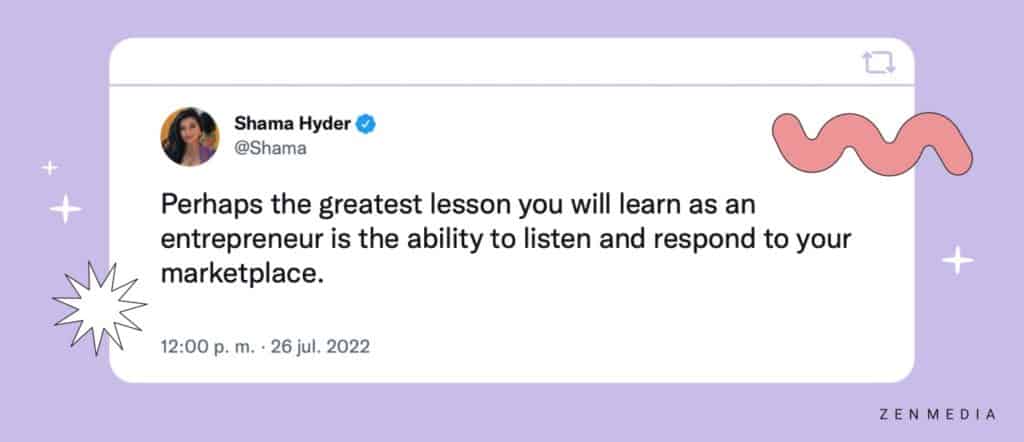Welcome to web3: the future of the internet.
This third edition of the World Wide Web aims to put more control in the hands of users rather than companies. The decentralization of data, the foundation of blockchains, and the metaverse are all significant characteristics of this upcoming digital era.
What is Web3?
Web3 is being dubbed “the future of the internet.” Focused on the decentralization of data, Web3’s aim is to improve user privacy, give individuals more control of the digital communities they participate in, and transform the digital landscape into a more immersive experience.
While there is still some time until web3 becomes a reality, data suggests that it will change how we think and use the internet—indefinitely.
The National Research Group reports that 83% of consumers who have heard about web3 believe it will improve their happiness and wellbeing. Because of this, many web3 startups are being generously funded, with 438 of these companies raising over $4.5 billion thus far.
While these concepts are at the front of everyone’s minds, we are still in the early stages of web3 development—the perfect time to start learning, ideating, and planning.
Here’s how we think web3 will change the scope of marketing for good.
How Web3 will disrupt marketing
The decentralization of Web3 will lead to transparent marketing.
One of the main goals of web3 is to make the internet more accessible and secure for its users. The fancy tech term for this change is decentralization. Decentralization takes power out of big tech companies’ hands by keeping individuals’ data private. Only the user can access and share their information.
Blockchain technology is what allows data decentralization to occur. The New York Times introduces the positives of blockchain as “a tool that promises to decentralize the structures governing all economic transactions and, in the process, redefine our concept of trust.”
While these protections may make marketers’ jobs more complicated, they will also make marketing strategies more transparent. Web3 will require marketers to focus on building relationships with prospects through direct communication. They will learn about their target audience by tracking how they engage with brands publicly on social media, and they will learn their audience’s likes and dislikes through interactive content like surveys and polls. As a result, marketers will be more open about what data they look for and how they will use it for future marketing tactics.
Decentralization is about realizing that your prospects are individuals rather than numbers in a dataset.
Be on the lookout for immersive virtual experiences.
Consumers want to feel connected when making purchase decisions. Leveraging AI and machine learning processes can help companies create immersive virtual experiences for consumers, stakeholders, and employees alike.
Of course, there is also the metaverse, “a virtual world where users can interact with one another through computer-generated personas called avatars.” These worlds allow individuals to go to digital events and experience new things using virtual reality technologies, among other digital platforms. And while there has been interesting strategies implemented in the metaverse by B2C brands like Chipotle and Louis Vuitton, according to Forrester, we’re not likely to see a metaverse marketing boom for B2Bs in 2023.
Instead, marketers should focus on building their digital presence through strong B2B social media marketing strategies, digital PR, and ensuring your website is optimized for search. If you want to begin dabbling in immersive virtual experiences, we recommend considering you virtual storefronts, digital training, and hosting virtual events.
Related reading: 9 Best Practices for Hosting a Virtual Event in 2022
Web3 will emphasize content marketing.
Content creators and marketers, get ready: web3 will give you your power back.
Nowadays, content creators are under the control of their respective platforms. From ever-changing algorithms to over-saturation of content, marketers must create assets with all these details in mind. Unfortunately, the lack of transparency in the past has made it difficult to make consistently successful, shareable content and be paid fairly for it.
The decentralization of the web should create an equal playing field, where strong content will be recognized and compensated more generously. Matthew Ball, identified as a “metaverse expert” by McKinsey, discusses this best:
“I believe absolutely that the advent of graphics-based computing and 3-D environments is going to change many of the technologies, standards, conventions, and monetization models. It’s going to have profound generational change. And, most importantly, it’s going to reach many of the categories we’ve long hoped would be altered by mobile and the internet and yet haven’t been.”
What does this mean for marketers? First, continue driving both organic and paid content for your brands. This new open ecosystem will bring many more opportunities for it to be seen.
Focus on creating community.
Last but certainly not least, web3 will focus on giving users a sense of community. The decentralization of data means that companies will have to rebuild consumers’ trust. It is less about what users can do for the brands they support and more about what these brands can do for their supporters.
Related reading: The Ultimate Guide to Community Management For Marketers
Shama Hyder, our CEO at Zen, sums up this idea in a tweet:
“Perhaps the greatest lesson you will learn as an entrepreneur is the ability to listen and respond to your marketplace.”

Create community by listening to your followers, responding to their needs, and finding new ways for them to connect and relate to each other. Hybrid events, NFTs, and virtual experiences are all things marketers can experiment with to see what works best for their audience. Not all individuals like the same content or experiences, and the entire purpose of web3 is to build community through individualism.
Four Web3 marketing strategies to try in 2023
As web3 marketing continues to gain momentum in 2023, B2B brands that embrace this new technology and adopt innovative strategies will be well-positioned to stand out in a crowded marketplace. Here are four web3 marketing strategies that B2B brands can use to create a competitive advantage:
1. Launch a blockchain-based loyalty program
One way to incentivize customers to engage with your brand is to create a blockchain-based loyalty program that rewards users with digital tokens or cryptocurrencies for their loyalty and engagement. This can create a sense of community and excitement around your brand, while also driving customer retention and repeat business.
2. Host a virtual conference on a decentralized platform
With the rise of virtual events, B2B brands can leverage decentralized platforms to host a cutting-edge conference that offers attendees a unique and engaging experience. By using blockchain-based platforms, you can create an immersive environment that allows attendees to connect and network in a secure and transparent way.
3. Partner with blockchain startups
To stay ahead of the curve in the web3 space, B2B brands can partner with innovative blockchain startups that are pushing the boundaries of what’s possible with decentralized technologies. By collaborating with these startups, you can tap into their expertise and gain access to new marketing channels and web3 marketing strategies.
4. Develop thought leadership content on decentralized technologies
Creating thought leadership content on decentralized technologies is a great way to establish your brand as an industry leader. By sharing insights and perspectives on blockchain, cryptocurrencies, and decentralized technologies, you can build trust and credibility with your customers while also positioning your brand as a leader in the web3 space.
Are you interested in reimagining your B2B marketing strategies for the oncoming web3 era? Let’s talk about it.







